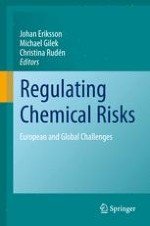2010 | OriginalPaper | Buchkapitel
12. Global Trends in Chemicals Management
verfasst von : Gunnar Bengtsson
Erschienen in: Regulating Chemical Risks
Verlag: Springer Netherlands
Aktivieren Sie unsere intelligente Suche, um passende Fachinhalte oder Patente zu finden.
Wählen Sie Textabschnitte aus um mit Künstlicher Intelligenz passenden Patente zu finden. powered by
Markieren Sie Textabschnitte, um KI-gestützt weitere passende Inhalte zu finden. powered by
